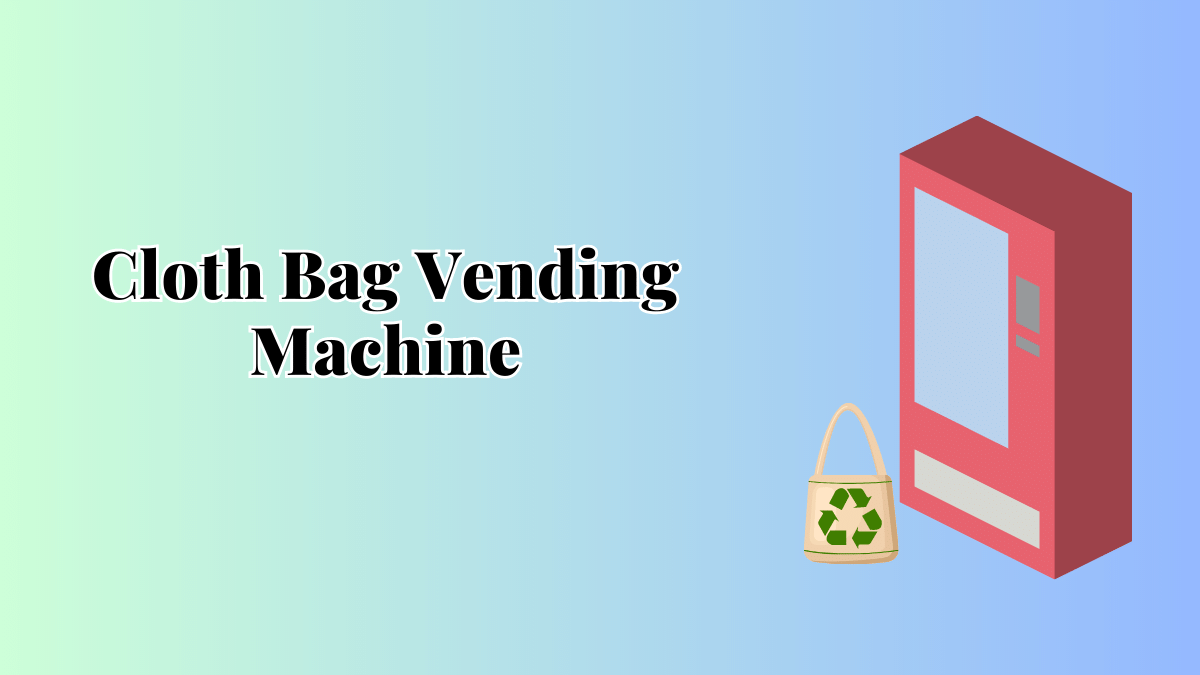As the world grapples with the environmental consequences of plastic pollution, sustainable living has become an urgent priority. In recent years, a growing number of individuals and businesses have been seeking eco-friendly alternatives to reduce their carbon footprint. One such innovative solution gaining popularity is the cloth bag vending machine. This article delves into the concept of cloth bag vending machines, their benefits, implementation, challenges, and future prospects.
The Need for Sustainable Alternatives
The adverse effects of single-use plastic bags on the environment have become evident, prompting the need for sustainable alternatives. Plastic bags, often used for a short time, end up in landfills or oceans, causing harm to wildlife and ecosystems. To combat this issue, people are embracing reusable cloth bags that significantly reduce plastic waste.
Understanding Cloth Bag Vending Machines
Cloth bag vending machines are a modern approach to promoting sustainability. These machines provide reusable cloth bags to shoppers as an alternative to single-use plastic bags. Customers can purchase these cloth bags conveniently and use them repeatedly, making them an excellent choice for eco-conscious consumers.
How Cloth Bag Vending Machines Work
Cloth bag vending machines are strategically placed in retail stores and supermarkets. When shoppers finish their purchases, they have the option to buy a reusable cloth bag from the vending machine. The process is simple and user-friendly, encouraging more shoppers to make the eco-friendly switch.
Benefits of Cloth Bag Vending Machines
5.1. Environmentally Friendly
By reducing the usage of single-use plastic bags, cloth bag vending machines play a vital role in curbing plastic pollution. Each time a shopper opts for a cloth bag, they contribute to a cleaner and greener environment.
5.2. Cost-Effective
While the initial investment in cloth bag vending machines may seem significant, the long-term cost savings are considerable. Retailers can reduce expenses spent on purchasing plastic bags and demonstrate their commitment to sustainability.
5.3. Promoting Eco-Consciousness
Cloth bag vending machines promote a culture of eco-consciousness among shoppers. By making cloth bags easily accessible, people are encouraged to adopt sustainable habits, thereby creating a positive impact on the environment.
Integrating Cloth Bag Vending Machines in Retail Stores
Implementing cloth bag vending machines effectively is crucial to maximize their impact on plastic reduction. Here are some strategies to facilitate integration:
6.1. Encouraging Customer Adoption
Retailers can offer incentives to customers who choose cloth bags, such as loyalty points or discounts. By encouraging adoption, more shoppers will be motivated to use cloth bags regularly.
6.2. Marketing and Promotion
Creating awareness about cloth bag vending machines through in-store displays, social media campaigns, and advertisements can attract more attention and encourage participation.
6.3. Collaborating with Brands and NGOs
Partnering with environmentally conscious brands and non-governmental organizations (NGOs) can amplify the message of sustainability and garner community support.
Overcoming Challenges and Concerns
While cloth bag vending machines have immense potential, certain challenges need to be addressed for successful implementation:
7.1. Maintenance and Hygiene
Retailers must ensure that cloth bag vending machines are regularly maintained and cleaned to provide users with hygienic bags.
7.2. Dealing with Resistance
Some shoppers might be hesitant to switch from plastic bags to cloth bags. Retailers can organize awareness campaigns and educate consumers about the benefits of reusable bags.
7.3. Ensuring Accessibility
Retailers should make sure that cloth bag vending machines are conveniently placed, easily accessible, and available at various store locations.
Global Success Stories
Several cities worldwide have embraced cloth bag vending machines, leading to positive outcomes:
8.1. Cities Embracing Cloth Bag Vending Machines
Cities like Vancouver, Copenhagen, and San Francisco have successfully implemented cloth bag vending machines, reducing plastic bag usage significantly.
8.2. Positive Impact on Plastic Consumption
Statistics from various locations indicate a substantial decrease in single-use plastic bag consumption after the introduction of cloth bag vending machines.
8.3. Community Engagement and Support
Communities actively participate in initiatives promoting cloth bag usage, fostering a sense of collective responsibility for the environment.
Future Prospects and Innovations
Cloth bag vending machines continue to evolve, with exciting innovations on the horizon:
9.1. Smart Features and IoT Integration
Advanced vending machines with IoT integration can track usage, monitor inventory, and provide real-time data for efficient management.
9.2. Expanding to Other Sustainable Products
In the future, vending machines can dispense other sustainable products like stainless steel straws, bamboo utensils, and eco-friendly containers.
9.3. Creating a Global Network
Establishing a global network of cloth bag vending machines would foster international collaboration and encourage sustainable practices worldwide.
Conclusion
The cloth bag vending machine presents a tangible solution to the plastic pollution crisis. By providing eco-conscious consumers with reusable cloth bags, we can collectively take significant strides towards a cleaner and more sustainable planet. Embracing this technology and encouraging its adoption is not only a responsibility but also an opportunity to create a lasting positive impact on the environment.




